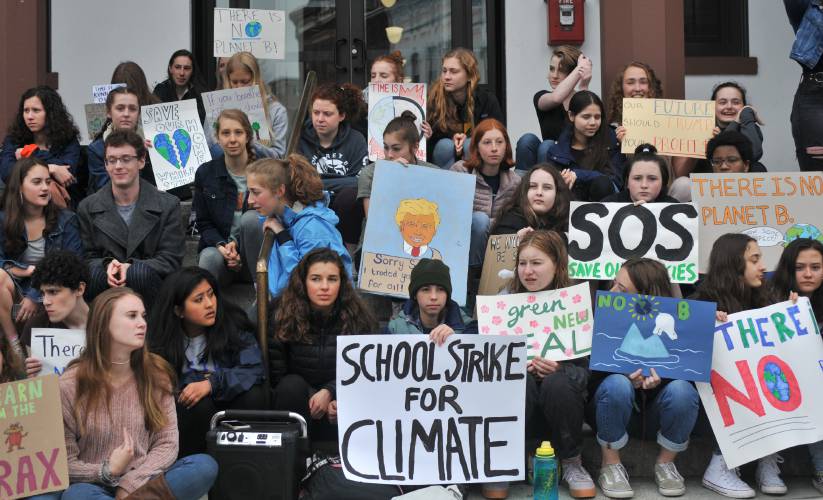Opinion: Why climate education is necessary
| Published: 03-05-2024 6:00 AM |
Ann Podlipny lives in Chester.
In the summer of 2023, forty teachers from New York gathered for a four-day training session, the goal of which was to expose educators to the topic of climate literacy so they could integrate it into their lesson plans. This is tangible proof that fifty years after Earth Day first championed the idea, climate education has become a reality. There is growing momentum for other states to take up this cause.
Why is climate education necessary? Because it gives students a foundational knowledge of science, the key to understanding climate change and developing solutions. They are also exposed to potential careers in the clean energy industry. The field of scientists, engineers and researchers must expand in order to develop mitigation and adaptation solutions.
This week the NH Legislature will consider a resolution (HR 30) that prioritizes climate education in the high school curriculum. As a former educator, I have great respect for curious students who seek to enrich their learning by incorporating challenging subjects into their coursework. What knowledge at this crucial time could be more important than understanding the root causes of climate change and its impact on a world these very students will inherit?
I am a longtime resident of Chester. Five years ago I proposed a warrant article resolution in support of honoring Indigenous Peoples’ Day. The town approved it persuaded I believe by the testimony of one high school student who stepped up to the podium asking that students like himself be taught all facts regarding the history of Columbus.
“Ignorance is not bliss” he argued. Just the opposite. Being under-informed or uniformed was to him a great disservice. In order to make up his mind, analyze data and think critically he needed complete information. His request ignited the community and the resolution passed overwhelmingly.
The same holds true for discussions about climate. As students face an increasingly unpredictable environmental future the more science-based data they receive the better informed they become and less likely to experience feelings of helplessness and despair. Instead, they are more likely to adopt the credo “don’t throw up your hands, roll up your sleeves.”
I have witnessed impressive results when students develop useful resources for civic engagement. Their knowledge builds effective communication skills and self-confidence. The lived experiences students share with each other whether they be extreme weather events or environmental justice concerns in their communities, they are creating an active youth corps together.
Article continues after...
Yesterday's Most Read Articles
 Concord may finally buy long-closed rail line with hopes of creating city-spanning trail
Concord may finally buy long-closed rail line with hopes of creating city-spanning trail
 New Hampshire targets sexual exploitation and human trafficking inside massage parlors
New Hampshire targets sexual exploitation and human trafficking inside massage parlors
 State rules Epsom must pay open-enrollment tuition to other school districts, despite its refraining from the program
State rules Epsom must pay open-enrollment tuition to other school districts, despite its refraining from the program
 New Cheers owners honor restaurant’s original menu while building something fresh
New Cheers owners honor restaurant’s original menu while building something fresh
 Remembered: Friends recall stories about the lives of those who died without housing
Remembered: Friends recall stories about the lives of those who died without housing
 A look ahead at the ‘preferred design’ for Concord’s new police headquarters
A look ahead at the ‘preferred design’ for Concord’s new police headquarters
You see firsthand how students mature as they share information. They write for newspapers, speak with local civic groups and state legislators, write petitions and request interviews with the governor. Clearly, elected officials value students who advocate passionately for environmental causes such as plastic reduction in school cafeterias, composting of dining hall waste, beach clean ups, water monitoring and testing or rallying to protect New Hampshire’s natural resources.
Passion combined with facts give students a sense of purpose and their growing involvement in climate literacy and climate engagement demonstrates a commitment to something larger than themselves. HR 30 will give students the unique opportunity to participate in the vital movement for a healthier planet.









 Opinion: Trumpism in a dying democracy
Opinion: Trumpism in a dying democracy Opinion: What Coolidge’s century-old decision can teach us today
Opinion: What Coolidge’s century-old decision can teach us today Opinion: The art of diplomacy
Opinion: The art of diplomacy Opinion: After Roe: Three years of resistance, care and community
Opinion: After Roe: Three years of resistance, care and community
